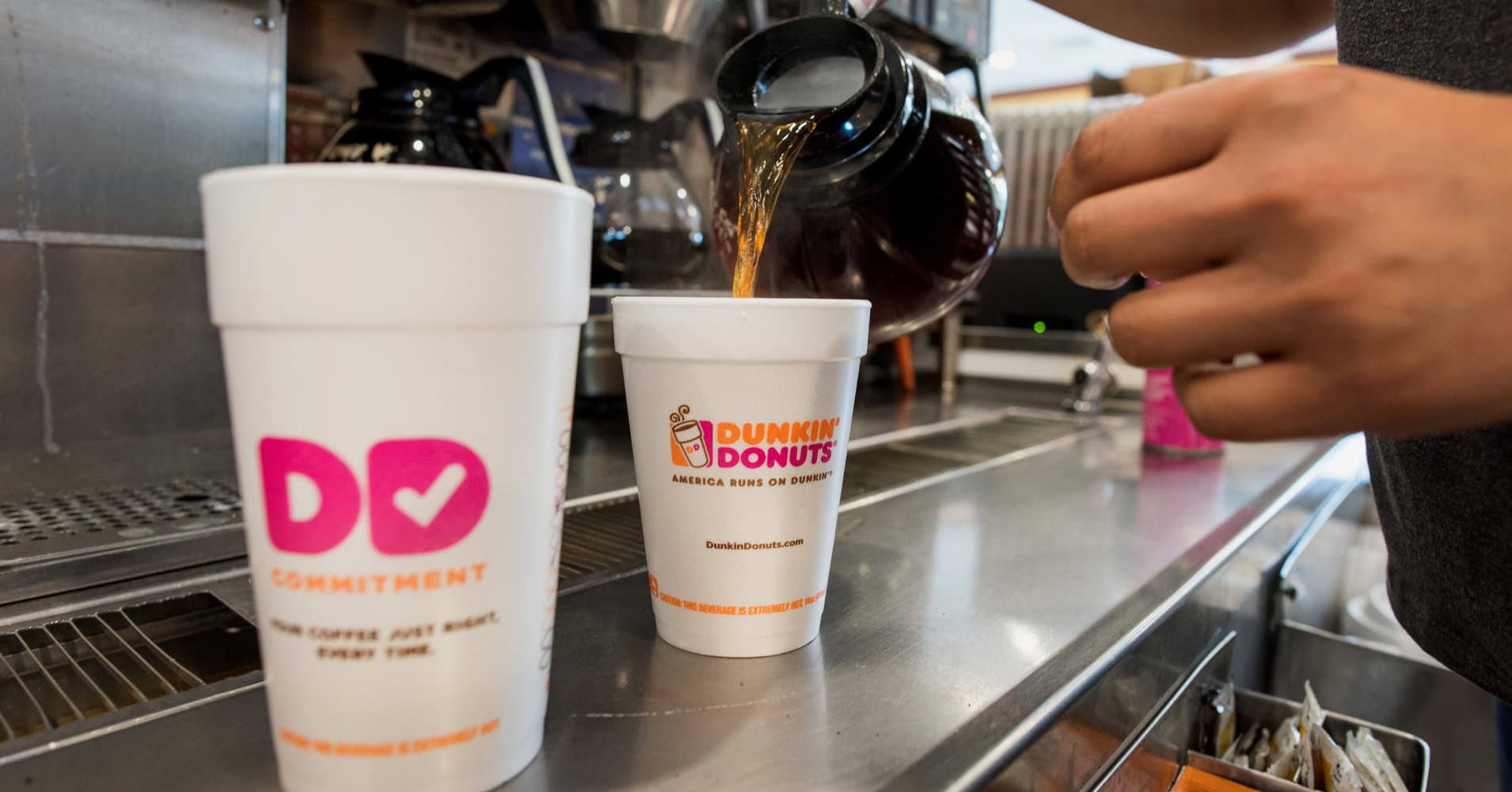
With franchisee support, Dunkin’ Brands‘ plan for growth is taking hold, as the company continues to modernize to entice younger consumers with new items such as espresso and on-the-go snacks.
Dunkin’ is investing $100 million to renovate its stores nationwide, adding cold coffee beverages on tap, a mobile drive-thru lane and featuring its baked goods more prominently in the front of the store. So far, the plan is paying off and moving ahead faster than expected, the company said.
Interest in the new store format from restaurant owners helped Dunkin’ surpass its initial goal of opening 50 of the so-called Next Generation stores this year. As of the end of the third quarter, Dunkin’ had opened 60 of these revamped locations.
The company reported earnings that topped expectations Thursday. Although foot traffic at its restaurants in the period was weak, customers were spending more. Dunkin shares were up more than 3 percent in trading Wednesday, and the stock has gained more than 11 percent so far this year.
David Hoffmann, Dunkin’s new CEO, told CNBC on Thursday the key to success is collaboration with franchisees. It’s a role he knows well, having run Dunkin’s U.S. business before he was promoted in July.
“We’re very inclusive with our franchisees when working through this process,” Scott Murphy, chief operating officer at Dunkin’, added. “So when we started this about a year and a half ago, to come up with the Next Gen image, we didn’t do it in a vacuum. We did it with them, and that’s an important piece of how we do everything, whether it’s relaunching espresso, launching a new [limited-time offer] or putting together a value platform.”
Murphy said the company works with a group of franchisees every month to get feedback on existing projects and develop new ones.
At a store opening in September in New York City, local franchisees praised the company’s collaborative efforts and said the changes to the storefront and menu seemed promising.
On Thursday, the company reported that net income in the quarter ended Sept. 29 rose to $66.07 million, or 79 cents per share, from $41.2 million, or 45 cents per share, a year earlier. Excluding items, the company earned 83 cents per share, better than the 73 cents per share analysts had forecast, according to Refinitiv estimates.
Revenue rose 6 percent to $350.01 million, higher than the $342.9 million expected by Wall Street.
Since February, Dunkin’ has been working to make itself known for more than just its doughnuts, going so far as to strip the word “Donuts” from its branding and logo.
The company has slimmed down its food menu and added hot and cold coffee beverages, including a relaunch of its lattes, cappuccinos and espressos in stores heading into the holiday season — territory that’s long been ruled by its rival Starbucks.
Hoffmann and Murphy expect Dunkin’s latest push into better espresso beverages, which will be priced below competitors, to help give it a leg up and lure in more coffee drinkers, thus boosting sales.
During the third quarter, sales at restaurants open more than a year were positive, up 1.3 percent, but shy of the 1.5 percent analysts had expected, according to Refinitiv.
Dunkin’ has no plans to stray from its roots in drip coffee, but it’s also trying to capture a younger consumer.
“It makes sense if we want to lean into this position as a beverage-led, on-the-go brand, espresso was the next place to focus,” Hoffmann said. “Espresso skews younger — I went from pop to drip coffee, but my kids are going from Coolattas to lattes.”
And as the brand pushes out from its stronghold in the Northeast, there’s demand for more specialty drinks.
“We see a larger mix on espresso as we go West, but there’s core beverage excitement in there too,” Murphy said.
Despite the excitement over store modernization efforts, the biggest headwind facing its owners right now is the tight labor market, Hoffmann said.
“It’s a reflection of a strong economy,” he said, adding that Dunkin’ is trying to combat potential labor shortages with a positive and flexible company culture. “It’s a lot of blocking and tackling — hiring for smiles, making sure people have the proper training, offering a flexible environment for today’s worker — making it an environment where people want to work.”
The company will continue to lend its voice in Washington, D.C., he said, lobbying on behalf of franchisees and on labor issues — something Nigel Travis, executive chairman of Dunkin’ Brands, said he planned to focus on as he stepped out of the CEO role earlier this year.
“It’s a lot of little things,” Murphy added. “Even new uniforms from ‘Life is Good’, making the stores cleaner and more hospitable, and reducing complexity behind the counter. It’s making that first job possibly a career where kids figure out how to become a shift supervisor, a restaurant manager, and maybe one day even a franchisee.”
Be the first to comment